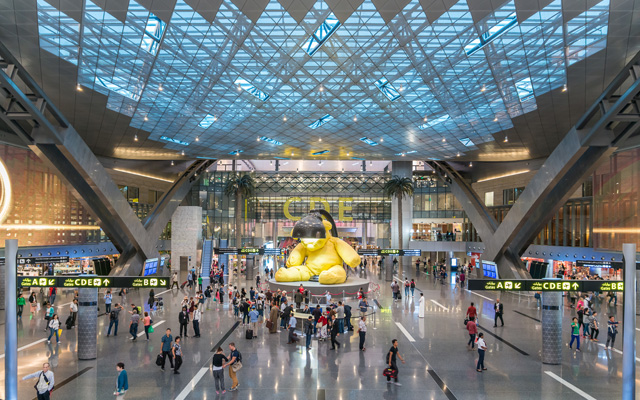- Travellers are choosing to avoid travelling to and transiting in the Middle East while regional tensions remain
- Preference for Asian destinations grows as interest in Middle East wanes, but impact is expected to be short-lived
- Travel insurance is ever more crucial, but pay attention to exclusions and official travel alerts

Festering unrest in the Middle East and a fragile ceasefire between Israel and Iran are keeping travel agents in Asia-Pacific on their toes, as customers seek regular updates and assistance with flight adjustments and trip changes.
Hellen Xu, CEO of Panorama JTB Tours Indonesia, told TTG Asia that some customers “are understandably anxious”.
“When tensions escalated, it’s only natural that people start to worry. We had a group scheduled to travel to Türkiye but decided to cancel — not because of any flight disruptions, but purely out of concern about how the situation might unfold,” Xu said.
She added that “a few” travellers have chosen to change their flights to airlines that do not fly through the Middle East.
Hendri Yapto, chief operating officer, Dwidaya Tour in Indonesia, said customers on flights transiting in the Middle East or Türkiye are concerned, and his team is assisting with changes and cancellations.
Malaysian travel specialists also see an impact on Middle Eastern destinations and transit hubs.
Mint Leong, managing director of Sunflower Holidays, said travellers heading to Europe in the coming months have asked to avoid transiting in Middle Eastern hubs like Doha and Dubai.
“Instead, they are opting for China-based airlines, despite the longer flight times and significantly higher airfares,” Leong said, adding that clients are willing to pay more for peace of mind and route certainty.
While there has been no cancellation yet for De Kim Tour & Travel’s scheduled group tours to the UAE in December, executive director Kathryn Lee said demand has slowed.
Lee told TTG Asia: “There are still seats available for the December departure, but we’ve decided to hold off on promoting the tour until there’s more clarity and stability in the region. We’re closely monitoring the situation. By October, we will assess whether to proceed as planned or make adjustments, depending on the geopolitical climate and traveller sentiment.”

Airline support cushions blow amid flight woes
Indonesia’s Golden Rama Tours & Travel had to grapple with flight changes for customers who wanted to avoid the Middle East altogether, especially in the early days of the Israel-Iran conflict and after Iran’s retaliation with an attack on US forces stationed at the Al Udeid Air Base in Qatar on June 23.
Edhi Sutadharma, director of tour leisure, recalled several hours of flight delays when Hamad International Airport in Doha was temporarily shut for safety, followed by delayed baggage arrivals. The suspension of several codeshare flights with Qatar Airways, including four operated by Garuda Indonesia, also added to his customers’ woes.
“As a result, finding alternative flights for our passengers was quite difficult. Some had to postpone their trips to as late as June 29, and even then, direct flights from Doha to Jakarta were unavailable. In certain cases, passengers had to be rerouted via Doha, Kuala Lumpur, and finally Jakarta,” Edhi said.
Recalling the peak of travel disruptions in June, travel agents were unanimous that how airlines responded during times of crisis would determine the impact on travellers.
Xu said: “Qatar Airways handled it really well. The team was proactive, cooperative, and quick to offer refunds or rescheduling where needed. That made a huge difference, both for our staff managing the situation and for reassuring clients.”
Edhi echoed Xu’s observations: “Qatar Airways’ communication has been clear and consistent, and has been helpful in offering refunds and rescheduling options for individual travellers”.
Qatar Airways has allowed customers with travel up to and including June 30 to amend their travel dates without paying a fee until July 15.
Xu noted that as the Israel-Iran conflict is taking place during a low season for Indonesian outbound, crisis management has been smooth.
“As long as we have clear communication and supportive airline partners, we can guide our customers through uncertainties. The key is staying flexible and focused on safety,” she added.

Short-lived travel hesitancy
Intrepid Travel, a group tour and adventure travel company with itineraries around the world, has seen a softening in demand for the Middle East and some cancellations to Jordan and Egypt.
However, Natalie Kidd, managing director of Asia and head of global operations, said the impact was “not as much as we initially expected”.
“Encouragingly, cancellations began to slow following positive developments including a ceasefire. We remain confident that Egypt and Jordan will rebound quickly, as they’ve historically been strong sellers for us globally. Global bookings for Egypt and Jordan in June are up 131 per cent and 137 per cent respectively year-on-year,” Kidd detailed.
When asked how destination preferences are changing amid Middle Eastern tensions, she said Asian destinations tended to see stronger interest as demand for the Middle East waned.
“From our Asian customer base, we’re seeing customers book Cambodia and Nepal. From our main source markets (Australia and New Zealand, Europe, the Middle East and Africa, and North America) we’re seeing strong growth in Asia for the month of June. Vietnam is up 21 per cent year-on-year, Japan up 19 per cent, and Sri Lanka up 29 per cent. Thailand is also performing well, particularly in the Australia and New Zealand market, where it’s up 35 per cent year-to-date,” she added.
Edhi told TTG Asia that Middle Eastern carriers like Qatar Airways and Emirates remained crucial for Indonesians travelling long-haul. As long as the “situation does not escalate into full-blown conflict”, he does not expect a major decline in upcoming travel demand.
“That said, if things worsen, alternative routes to Europe exist, so travel is still possible,” he added.
Kidd believes that travel hesitancy will be short-lived, as “history shows us that demand tends to rebound quickly once stability returns in the region”.
She said: “As a global business with 31 offices around the world, more than 3,000 staff and tour leaders, and operations in 118 countries, we know that travel is important for keeping families, cultures, communities and economies connected and thriving. We believe that travel has the power to connect people and build understanding – especially in times of uncertainty.
“That said, we appreciate that safety is a personal and evolving consideration, and we want to be upfront and transparent about the realities on the ground. We always advise travellers that their government travel advice is the best source of up-to-date information.”
Travel with protection
Growing volatility, uncertainty, complexity and ambiguity of conditions around the world has an impact on travel and tourism, forcing travellers to get wiser about travel insurance.
According to a spokesperson for Zurich Cover-More, Zurich’s global travel insurance and assistance business, travellers today are seeking more protection and proactive care from their travel insurance providers, and the uptake of travel insurance has seen a marked upward trend worldwide since the global Covid-19 pandemic.
Beyond the purchase of travel insurance, there has also been a stronger reliance on supportive travel apps.
The spokesperson said: “Zurich Cover-More is witnessing increasing interest in, and uptake and usage of, our portfolio of travel safety and assistance apps. These apps provide destination-specific safety advice as well as real-time safety alerts based on a traveller’s location and include click-to-call access to emergency assistance from our global command centres.”
However, with more flash points occurring across the world, would travel insurance policies’ range of coverage evolve?
In response, Zurich Cover-More’s spokesperson warned that not all travel insurance policies are the same, so travellers must pay attention to policy details.
“Though exclusions are generally standard across all travel insurance providers in all markets, people should pay attention to travelling against government advice (such as Do Not Travel warnings by government bodies); travel impacted by war, civil war, invasion, revolution or any similar event; disinclination to travel, change of mind or fear of travelling; and other circumstances as described in relevant Policy Wording and Product Disclosure Statements.
“We recommend that travellers should always read their policy documents prior to purchasing travel insurance and speak with their local travel insurance provider if they have questions.” – Additional reporting by Tiara Maharani and S Puvaneswary











